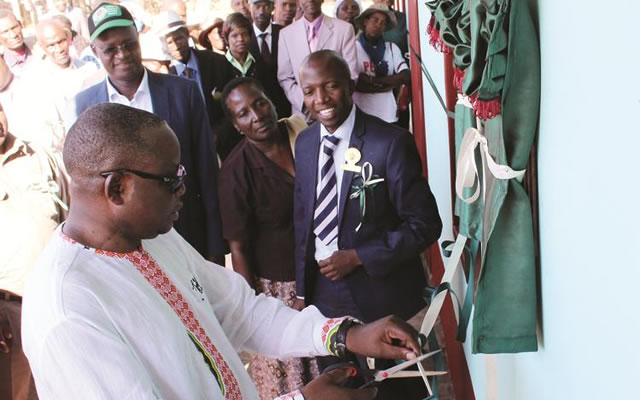2,000 new schools needed: Mavhima


Deputy Minister of Primary and Secondary Education Cde Paul Mavhima cuts a ribbon to commission a classroom-block at Dibutibu Primary School in Sipepa, Tsholotsho, yesterday. Looking on from left are the Minister of Information, Media and Broadcasting Services, Professor Jonathan Moyo, Provincial Education Director Boitathelo Mguni and Chief Matupula
Mashudu Netsianda Senior Reporter
DEPUTY Minister of Primary and Secondary Education, Cde Paul Mavhima, has said the country needs at least 2,000 new schools to adequately cover the shortage and improve on the learning environment for children.Speaking during the commissioning of a new classroom block at Dibutibu Primary School in Tsholotsho yesterday, Cde Mavhima said the country is facing a shortage of schools, a situation that had seen some schoolchildren travelling long distances.
“We did a mapping exercise and found that we need about 2,000 new schools in the country and this is largely because we now have new suburbs being developed in urban areas and we also have new resettlement areas. Children in some parts of the country travel long distances to school,” said Cde Mavhima.
He said government has also secured partners for a joint venture to build more schools and rehabilitate existing ones as part of efforts to strengthen the country’s education system.
“In most existing schools you’ll find that there are old classroom blocks which are falling apart because of limited resources. We’ve identified partners to assist in the development of infrastructure. We also urge communities to continue partnering government in our effort to address the challenge,” said Cde Mavhima.
The deputy minister commended the Tsholotsho Rural District Council through its Communal Areas Management Programme for Indigenous Resources (Campfire) which contributed $32,000 towards the construction of the classroom block at Dibutibu Primary School.
The council donated $26,000 for the construction of the classroom block and an additional $6,000, which was used to buy furniture. The local community contributed labour.
“The total value of the classroom block is $100,000. Campfire contributed $32,000 while the sweat of the community has created the worth of the value of $70,000, which is the social capital,” said Cde Mavhima.
He said education creates better opportunities for the community.
“The future of our country hinges on education. Our country is number one in Africa as far as literacy rate is concerned. As government we’re committed to ensuring that we strengthen our education system,” said Cde Mavhima.
The Ministry of Primary and Secondary Education embarked on the curriculum review in October last year and it is expected to include academic, vocational and technical training.
“It’s business that brings innovation so our new curriculum places much emphasis on entrepreneurship so that our children can be able to lead in the development of the country and compete with other countries like China and Malaysia. We also need to emphasise on heritage looking at our values in the pre-colonial era and how we fought the liberation struggle as well as the issue of patriotism,” he said.
The deputy minister also reiterated that no child should be expelled from school for non-payment of levies. He said every child has a right to education as enshrined in the African Union Charter on the Rights and Welfare of the Child.
Cde Mavhima also urged people of Tsholotsho to rally behind Zanu-PF candidate for the Tsholotsho seat, Information, Media and Broadcasting Services Minister, Prof Jonathan Moyo, in the June 10 by- election.
“You people of Tsholotsho are so lucky because you have a great man in the mould of Professor Jonathan Moyo who has the ability to connect and bring meaningful development to your area. Vote for him in next week’s parliamentary by-election. He is like gold or diamond and you should therefore be proud of him,” said Prof Mavhima.
Last week Prof Moyo bought 11 computers with internet connectivity for Sipepa High School so as to broaden pupils’ knowledge in ICT.










Comments